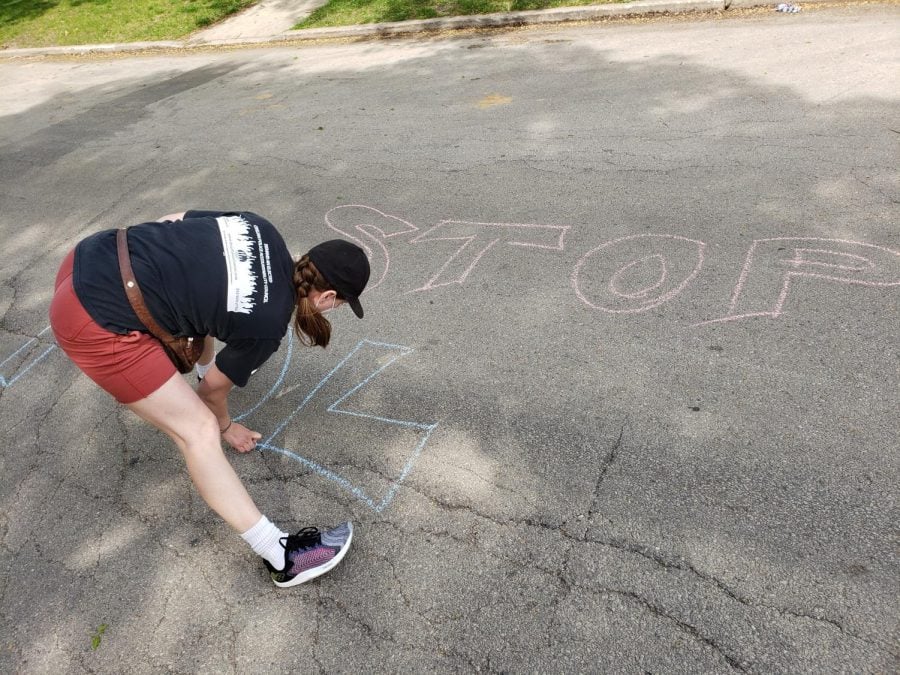EFBL and Jewish Voice for Peace hold teach-in on Palestine and Israel in Reclaim the Block Party
A woman writes a protest message in the street with chalk. EFBL’s second “Reclaim the Block Party” event outside EPD was a teach-in on Palestine and Israel, co-hosted by members of Jewish Voice for Peace-Chicago.
May 17, 2021
Organizers with Evanston Fight for Black Lives and members of Jewish Voice for Peace-Chicago discussed the history of Zionism and Israeli settlements within Palestine at a Sunday teach-in outside of Evanston Police Department.
Speakers centered historical events like the Nakba, when the newly-created Israeli state displaced over 750,000 Palestinians in 1948, and connected them to violence by Israeli forces in the West Bank and Gaza today.
Carol Muskin, an organizer with JVP-Chicago, said during the event that her connection with a Palestinian exchange student she hosted radicalized her perspective around the issue. She said recent messages from the student, who lives in East Jerusalem, showed her how dire the situation has become for Palestinians.
“She said, and I’m quoting, ‘Thank you, me and my family are good, but things are so terrible and it’s not safe at all,’” Muskin said. “‘We’re living an emotional and psychological torture, seeing children killed when you can’t do anything. Also, there are so many settlers all over the area holding knives.’”
The teach-in was EFBL’s second “Reclaim the Block Party” event held outside EPD, the first of which occurred two weeks earlier and featured Evanston youth painting abolitionist banners along Elmwood Avenue in front of the building. At that event, attendees received resource packets that included a reading list, infographics, poetry and action items they could complete to help defend Palestinian rights.
Evanston Township High School senior and EFBL organizer Anna Grant-Bolton said that beyond the current international focus on Israel and Palestine, discussing the practices and training of the Israeli military is important because of how they are directly tied to law enforcement in the US.
“A lot of the police from the United States train with Israeli soldiers, and Israeli soldiers train with United States police departments,” Grant-Bolton said. “So we see those intersections there, and that common thread of police and state violence.”
Muskin said attendees could find out more about this relationship through Deadly Exchange, a JVP project focused on ending international partnerships and training programs between the Israeli military and American law enforcement agencies.
Muskin said that a number of organizers in JVP Chicago, including herself, are from Evanston and that making connections between the two cities is vital to succeeding in their work.
“We’re always looking to connect with what’s going on in Evanston, and especially to connect with and value these youth voices,” Muskin said. “I want to give a shoutout to Evanston Fight for Black Lives for pulling us together for this lively discussion.”
Members of the EPD Chaplain Program, composed of local faith leaders appointed to provide spiritual support to the department, were present on the sidewalk throughout the event. Before the event began, two EPD officers approached EFBL organizers and told them painting the street would result in their arrest.
Grant-Bolton said this was the first time the department has threatened arrest for street painting, and that the content of their most recent street message may have caused the change in attitude.
“In the past we had painted ‘Defund EPD,’ and this most recent time we painted ‘Abolish EPD,’” Grant-Bolton said. “That definitely could be a contributing factor.”
After the speakers finished, attendees broke into two groups to talk through different perspectives and questions from the resource packet. Much of the conversation focused on pushing back against “complexity” as a reason to avoid discussion and taking a stance on the issue.
Northwestern Ph.D. student and JVP organizer Isaac Ginsberg Miller said that knowing the history of Palestinian displacement is key to understanding the current situation, since major events are often underplayed or omitted from many narratives.
“The Nakba is simultaneously ever-present in Israel and Israeli society, and yet nowhere appears in Zionist education,” Ginsberg Miller said. “To acknowledge the Nakba is to acknowledge that, in contrast to this slogan of ‘a land without a people for a people without a land,’ which is really pounded into us from a young age, that there were a people living in the land of Palestine prior to Zionist colonization.”
Email: [email protected]
Twitter: @alexhairysun
Related Stories:
— Youth gather, paint abolition banners at Evanston Fight for Black Lives ‘Reclaim the Block’ event
— EFBL and NUCNC honor Adam Toledo and Daunte Wright in march for police abolition
— Evanston Fight for Black Lives launches sit-in series to defund EPD


